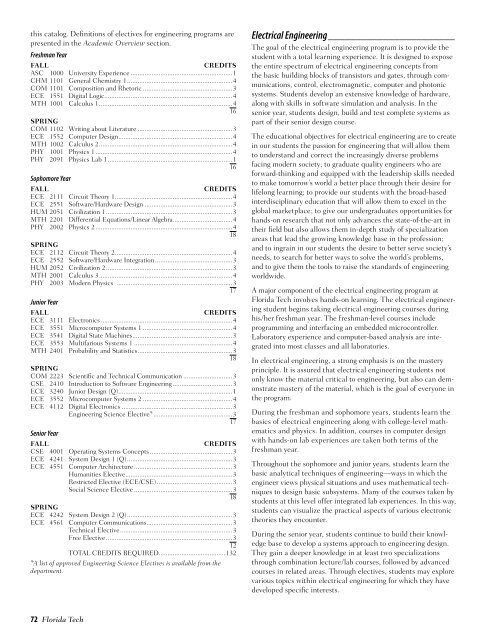2008–2009 - Florida Institute of Technology
2008–2009 - Florida Institute of Technology
2008–2009 - Florida Institute of Technology
You also want an ePaper? Increase the reach of your titles
YUMPU automatically turns print PDFs into web optimized ePapers that Google loves.
this catalog. Definitions <strong>of</strong> electives for engineering programs are<br />
presented in the Academic Overview section.<br />
Freshman Year<br />
FALL CREDITS<br />
ASC 1000 University Experience ..........................................................1<br />
CHM 1101 General Chemistry 1 ............................................................4<br />
COM 1101 Composition and Rhetoric ...................................................3<br />
ECE 1551 Digital Logic.........................................................................4<br />
MTH 1001 Calculus 1 ............................................................................4<br />
16<br />
SPRING<br />
COM 1102 Writing about Literature ......................................................3<br />
ECE 1552 Computer Design .................................................................4<br />
MTH 1002 Calculus 2 ............................................................................4<br />
PHY 1001 Physics 1 ..............................................................................4<br />
PHY 2091 Physics Lab 1 .......................................................................1<br />
16<br />
Sophomore Year<br />
FALL CREDITS<br />
ECE 2111 Circuit Theory 1 ...................................................................4<br />
ECE 2551 S<strong>of</strong>tware/Hardware Design ..................................................3<br />
HUM 2051 Civilization 1 ........................................................................3<br />
MTH 2201 Differential Equations/Linear Algebra ..................................4<br />
PHY 2002 Physics 2 ..............................................................................4<br />
18<br />
SPRING<br />
ECE 2112 Circuit Theory 2 ...................................................................4<br />
ECE 2552 S<strong>of</strong>tware/Hardware Integration ............................................3<br />
HUM 2052 Civilization 2 ........................................................................3<br />
MTH 2001 Calculus 3 ............................................................................4<br />
PHY 2003 Modern Physics ..................................................................3<br />
17<br />
Junior Year<br />
FALL CREDITS<br />
ECE 3111 Electronics ...........................................................................4<br />
ECE 3551 Microcomputer Systems 1 ...................................................4<br />
ECE 3541 Digital State Machines .........................................................3<br />
ECE 3553 Multifarious Systems 1 ........................................................4<br />
MTH 2401 Probability and Statistics ......................................................3<br />
18<br />
SPRING<br />
COM 2223 Scientific and Technical Communication ............................3<br />
CSE 2410 Introduction to S<strong>of</strong>tware Engineering ..................................3<br />
ECE 3240 Junior Design (Q) .................................................................1<br />
ECE 3552 Microcomputer Systems 2 ...................................................4<br />
ECE 4112 Digital Electronics ...............................................................3<br />
Engineering Science Elective* .............................................3<br />
17<br />
Senior Year<br />
FALL CREDITS<br />
CSE 4001 Operating Systems Concepts ...............................................3<br />
ECE 4241 System Design 1 (Q) ............................................................3<br />
ECE 4551 Computer Architecture ........................................................3<br />
Humanities Elective .............................................................3<br />
Restricted Elective (ECE/CSE) ...........................................3<br />
Social Science Elective ........................................................3<br />
18<br />
SPRING<br />
ECE 4242 System Design 2 (Q) ............................................................3<br />
ECE 4561 Computer Communications.................................................3<br />
Technical Elective ................................................................3<br />
Free Elective ........................................................................3<br />
12<br />
TOTAL CREDITS REQUIRED ......................................132<br />
*A list <strong>of</strong> approved Engineering Science Electives is available from the<br />
department.<br />
72 <strong>Florida</strong> Tech<br />
Electrical Engineering _______________________<br />
The goal <strong>of</strong> the electrical engineering program is to provide the<br />
student with a total learning experience. It is designed to expose<br />
the entire spectrum <strong>of</strong> electrical engineering concepts from<br />
the basic building blocks <strong>of</strong> transistors and gates, through communications,<br />
control, electromagnetic, computer and photonic<br />
systems. Students develop an extensive knowledge <strong>of</strong> hardware,<br />
along with skills in s<strong>of</strong>tware simulation and analysis. In the<br />
senior year, students design, build and test complete systems as<br />
part <strong>of</strong> their senior design course.<br />
The educational objectives for electrical engineering are to create<br />
in our students the passion for engineering that will allow them<br />
to understand and correct the increasingly diverse problems<br />
facing modern society; to graduate quality engineers who are<br />
forward-thinking and equipped with the leadership skills needed<br />
to make tomorrow’s world a better place through their desire for<br />
lifelong learning; to provide our students with the broad-based<br />
interdisciplinary education that will allow them to excel in the<br />
global marketplace; to give our undergraduates opportunities for<br />
hands-on research that not only advances the state-<strong>of</strong>-the-art in<br />
their field but also allows them in-depth study <strong>of</strong> specialization<br />
areas that lead the growing knowledge base in the pr<strong>of</strong>ession;<br />
and to ingrain in our students the desire to better serve society’s<br />
needs, to search for better ways to solve the world’s problems,<br />
and to give them the tools to raise the standards <strong>of</strong> engineering<br />
worldwide.<br />
A major component <strong>of</strong> the electrical engineering program at<br />
<strong>Florida</strong> Tech involves hands-on learning. The electrical engineering<br />
student begins taking electrical engineering courses during<br />
his/her freshman year. The freshman-level courses include<br />
programming and interfacing an embedded microcontroller.<br />
Laboratory experience and computer-based analysis are integrated<br />
into most classes and all laboratories.<br />
In electrical engineering, a strong emphasis is on the mastery<br />
principle. It is assured that electrical engineering students not<br />
only know the material critical to engineering, but also can demonstrate<br />
mastery <strong>of</strong> the material, which is the goal <strong>of</strong> everyone in<br />
the program.<br />
During the freshman and sophomore years, students learn the<br />
basics <strong>of</strong> electrical engineering along with college-level mathematics<br />
and physics. In addition, courses in computer design<br />
with hands-on lab experiences are taken both terms <strong>of</strong> the<br />
freshman year.<br />
Throughout the sophomore and junior years, students learn the<br />
basic analytical techniques <strong>of</strong> engineering—ways in which the<br />
engineer views physical situations and uses mathematical techniques<br />
to design basic subsystems. Many <strong>of</strong> the courses taken by<br />
students at this level <strong>of</strong>fer integrated lab experiences. In this way,<br />
students can visualize the practical aspects <strong>of</strong> various electronic<br />
theories they encounter.<br />
During the senior year, students continue to build their knowledge<br />
base to develop a systems approach to engineering design.<br />
They gain a deeper knowledge in at least two specializations<br />
through combination lecture/lab courses, followed by advanced<br />
courses in related areas. Through electives, students may explore<br />
various topics within electrical engineering for which they have<br />
developed specific interests.

















